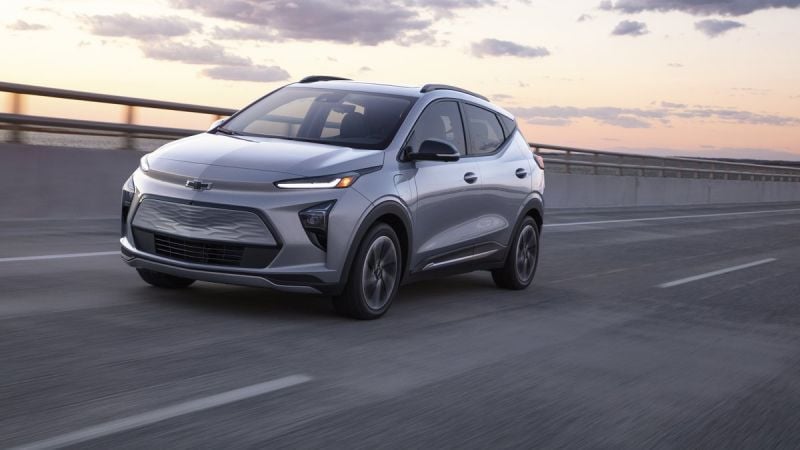We’ve driven the Chevy Bolt. And we mean really driven it, not just a cautious lap around the suburbs. It’s an honest, well-engineered electric vehicle with real personality: agile in the corners, instantly responsive off the line, and remarkably practical for its size. It’s the kind of car that makes you appreciate how far the EV segment has come, not just in range or charging speeds but in the way these cars now fit seamlessly into everyday life.

But as with all machines, progress doesn’t exempt you from the realities of ownership. And sometimes, those realities show up in the form of an unexpected repair bill, even for a vehicle less than a year old.
Maine Chevy Bolt Owner’s Unexpected Brake Repair Woes
One Bolt owner in Maine recently found this out the hard way. His story, shared online, cuts straight to the heart of a broader issue facing EV owners in regions with harsh winters and strict state inspection protocols.
“Bought a 2021 Bolt this past August and took it to get the state inspection sticker and got a shock.... I'm in Maine and have been using 1-pedal driving, but apparently, that allows rust to build up on the breaks and rotors (in these snowy, salt-ridden roads).
So now I have to spend $1,300 to replace all breaks and roters on a car I bought less than a year ago....I am not impressed.”
Hidden EV Brake Challenges
It’s a frustrating outcome and not entirely surprising for those who live in the land of snow, salt, and frost-heaved pavement. The very system that makes the Bolt such an efficient and refined drive, regenerative braking, can also result in the friction brakes seeing far less use than on a conventional internal combustion vehicle. That’s the beauty of one-pedal driving: smooth deceleration without ever touching the brake pedal. However, that same lack of use can cause surface corrosion to form on the rotors, especially when road salt enters the mix. And while the brakes may technically work, inspections often focus on wear and condition, not just function, and that can mean replacing perfectly good parts for the sake of meeting inspection standards.
Key Features Driving Efficiency, Range, & Innovation
- The Bolt EV is a fully electric hatchback designed for practicality and efficiency, offering a compact size without sacrificing interior space.
- It features a long driving range on a single charge, making it suitable for both daily commutes and longer trips, while supporting fast-charging capabilities.
- With responsive acceleration and a tech-forward cabin, it blends eco-friendly performance with modern features like regenerative braking and advanced driver-assist systems.
EVs are often touted, and rightly so, as lower-maintenance alternatives to traditional gas-powered cars. They don’t need oil changes, spark plugs, or exhaust system replacements. Over the long term, they really do cost less to keep on the road. A 2020 study by Consumer Reports found that EV owners spend roughly 50% less on maintenance and repairs compared to gas vehicle owners over the life of the car. But that doesn’t mean there aren’t occasional hiccups. A corroded rotor here, a specialty part there — these are growing pains in a still-maturing segment of the market.
Unpacking the $1,300 Bill: OEM Costs vs. Aftermarket Savings on the Bolt
So what’s behind the $1,300 repair estimate? That’s where things get murkier. OEM parts for modern vehicles, especially electric ones, often carry a hefty premium, and labor rates at dealerships continue to climb. But let’s be honest: that figure seems high, even by today’s standards.

A competent independent shop could likely do the job for significantly less, and aftermarket parts, coated rotors, and ceramic pads are readily available for a fraction of the cost. RockAuto, for example, lists quality rotors for around $50 each and brake pad sets for under $100. Even with labor, the total shouldn't have to eclipse $700. That discrepancy is less about EVs and more about where and how he work is being done.
Should New Chevy Bolts Face Old Inspection Standards? A Regulatory Debate
There’s also a bigger question here, should a car as new as a 2021 Bolt really be subject to the same rigorous inspection standards as a ten-year-old commuter with 150,000 miles on the odometer? On one hand, state inspections are a vital safeguard, especially in areas with brutal winters and questionable road conditions. The National Highway Traffic Safety Administration estimates that mechanical failures contribute to about 12% of crashes (NHTSA, 2021). But there’s a strong case to be made for nuance in the system, a way to recognize when newer technologies require a different approach, not just a box-checking process left over from the era of drum brakes and distributor caps.
Balancing Modern Performance with Real-World Ownership Challenges
Ultimately, the Chevy Bolt remains one of the most approachable and rewarding EVs on the market. It’s efficient, fun, and thoughtfully designed, but like any car, it’s still subject to the realities of weather, maintenance, and the regulatory systems that surround it. The experience of this Maine owner is a useful reminder that even as we move forward into an electrified future, we haven’t yet left behind all the old challenges. Still, that’s no reason to lose faith. If anything, it’s a reason to keep improving, not just our vehicles but the systems that support them.
Noah Washington is an automotive journalist based in Atlanta, Georgia. He enjoys covering the latest news in the automotive industry and conducting reviews on the latest cars. He has been in the automotive industry since 15 years old and has been featured in prominent automotive news sites. You can reach him on X and LinkedIn for tips and to follow his automotive coverage.
Set Torque News as Preferred Source on Google













Comments
I've tried out one-pedal…
Permalink
I've tried out one-pedal driving, and I honestly can't understand where you're finding "fun" in it. It's akin to operating a blender or a washing machine, not fun at all.
If there's one feature I absolutely do not want my car to have, it's one-pedal driving.
I get it
Permalink
In reply to I've tried out one-pedal… by G. G. (not verified)
I get it
State safety inspections…
Permalink
State safety inspections cover more then just looking/ checking brakes - wheel bearings which play a major part in “all” vehicles are checked along with wiper blades, lighting, clarity of glass ( no cracks or stone chips - tire trad depth along with age cracking - I could go on and on, but I’m hoping you get the point
Sure glad I don't live in a…
Permalink
In reply to State safety inspections… by Tony McCurdy (not verified)
Sure glad I don't live in a state that requires that BS.
Absolutely! I get your point.
Permalink
In reply to State safety inspections… by Tony McCurdy (not verified)
Absolutely! I get your point.
This happened to my 2019…
Permalink
This happened to my 2019 Bolt as well. I thought I was winning the game by never using my brakes, but 4 years in my service advisor told me my brakes and rotors were destroyed from the inactivity. I even got a second opinion to be sure I wasn't being taken to the cleaners, but it was true and I needed brakes and rotors replaced on all four. (This was with 19,000 mi on the car) Now I never use one peddle driving, it's just not worth the expense in New England.
It doesn't have to be all or…
Permalink
In reply to This happened to my 2019… by Brent S (not verified)
It doesn't have to be all or nothing....you just need to use your actual brakes once and a while.
Exactly!
Permalink
In reply to It doesn't have to be all or… by Matt (not verified)
Exactly!
Interesting experience!
Permalink
In reply to This happened to my 2019… by Brent S (not verified)
Interesting experience!
I'm sure that this is…
Permalink
I'm sure that this is something that will be addressed in the future. I live in Maine and before the days when stainless steel exhaust was common. I was having to replace exhaust parts every year and a radiator after several years. Now I'm going on a vehicle 12 years without any corrosion issues.
You're right!
Permalink
In reply to I'm sure that this is… by Keith (not verified)
You're right!
One pedle driving isnt s…
Permalink
One pedle driving isnt s feature, it's a consequence of regenerative braking....and driving with no coast is awful. Feels like a parachute went out the back everytime you let off the gas.
Efficiency studies run on…
Permalink
Efficiency studies run on EVs last year found that one pedal driving reduced the over all range of the cars versus coasting then braking. They tested tesla, ford, gm and kia EVS. Yeah. I was surprised too. But thats the difference between facts and ideals
that's good!
Permalink
In reply to Efficiency studies run on… by Jay smiles (not verified)
that's good!
really interesting!
Permalink
In reply to Efficiency studies run on… by Jay smiles (not verified)
really interesting!
I understand since I had…
Permalink
I understand since I had used only ReGen in both my 2013 and 2019 Chevy Volts . . . The Original Rotors / Pads soon failed Safety Sticker Inspections ... the Pads were still 'like new' thickness but the Rotors first developed a relatively even / smooth rusty appearance. Then the Rotors developed pits and the pits formed craters and valleys. And in just 3 years what a mess. The Dealer Service wasn't using OEM Genuine Replacement Parts and they only lasted 2 years . . . Note that when I insisted on OEM Standards I was able to find several other Parts Producers that use even higher grade materials.
Wow, it sounds like you had…
Permalink
In reply to I understand since I had… by Xemu X Xenu Jr (not verified)
Wow, it sounds like you had quite the experience with your Chevy Volts!
I Love driving electric cars…
Permalink
I Love driving electric cars, but I also love driving, so I pretty much despise one pedal mode. Most electric cars will regen with initial brake pedal application and only blend in hydraulic brakes once you decelerate beyond a certain rate. There is therefore no efficiency benefit to one pedal driving, just aggravation.
Sounds great!
Permalink
In reply to I Love driving electric cars… by Mark (not verified)
Sounds great!
People who don't like one…
Permalink
People who don't like one pedal driving just don't know how to use it. You can absolutely coast just have to find the sweet spot and saying it's less efficient than coasting is misinformation that study probably had people who didn't know how to use it properly!
I have a 2016 Nissan…
Permalink
I have a 2016 Nissan Frontier that didn't get driven much. In 2018, the rotors were a rusted mess at 20,000 miles. I replaced them with coated rotors and those are still on the truck today in fine condition at only 40,000 miles. It was garbage steel from the factory! For about $5 more per rotor, they could have put good quality steel into them, instead they ship out trash and don't care because it is a "wear" part and not covered by warranty. That also means more business for the dealer's service shop. It should be illegal.
That’s frustrating! Should…
Permalink
In reply to I have a 2016 Nissan… by Steve (not verified)
That’s frustrating! Should be better quality control instead of cutting corners.